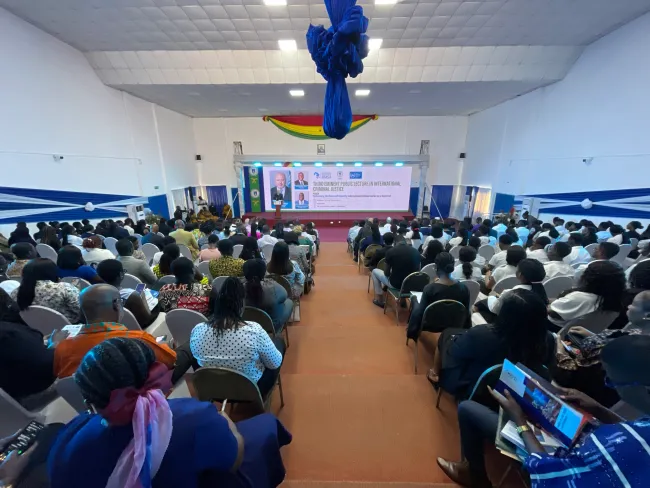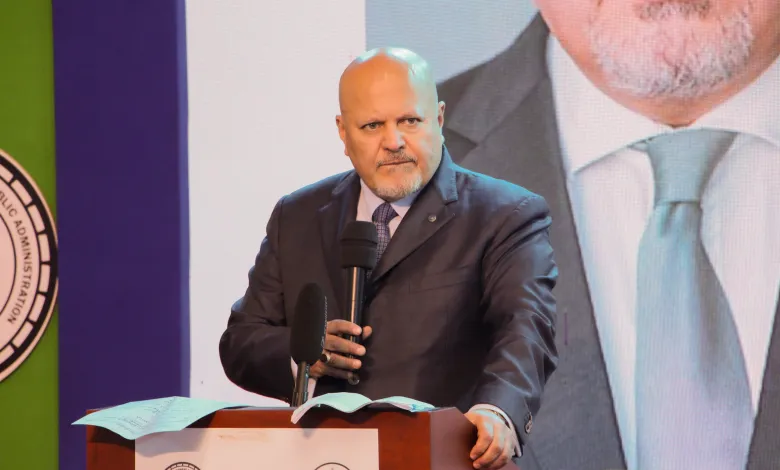The once-strained relationship between the International Criminal Court (ICC) and the African continent, which had persisted for over a decade, is on the mend, according to Karim Khan KC, the ICC’s Prosecutor.
During a recent lecture at the Ghana Institute of Management and Public Administration (GIMPA), Khan emphasised that since he assumed office in 2021, his efforts have been focused on addressing the fractures between the Court and Africa, resulting in a stabilization of relations.
“The Office of the Prosecutor received good cooperation from the Sudanese authorities, including for conducting various investigative missions to Khartoum,” Khan remarked.
Karim Khan recalled the initial positive relationship between Sudan and the ICC after the United Nations Security Council (UNSC) referred the situation in Darfur to the Court in 2005.
“During those early years, the relationship with the ICC and the African Union was rather close and collaborative, and there were serious ongoing discussions on the establishment of a liaison office in Addis Ababa.
“Similar to the previously established liaison office with the UN in New York so that the exchanges with the regional organisation of the continent where the ICC was mostly engaging would become even more fluid.”
Karim Khan KC, the ICC’s Prosecutor
However, Karim Khan revealed that the relationship took a dramatic turn when the ICC issued arrest warrants against high-profile Sudanese figures, including Ali Kushayb, Ahmed Harun, and former Sudanese President Omar Al-Bashir. Al-Bashir’s case, in particular, created a flashpoint in relations.
Khan explained that the tensions were not only between the ICC and Sudan but also extended to the broader African continent. Many African states and the AU perceived the ICC’s actions as targeting sitting heads of state, leading to accusations of an anti-African bias.
“This perception of the ICC as an institution selectively targeting African leaders led to intense debates over head-of-state immunity and the sovereignty of non-State Parties to the Rome Statute,” Khan noted.
Karim Khan noted that this friction was further exacerbated during the ICC’s investigation into Kenya’s post-election violence between 2010 and 2015. The case against Kenyan President Uhuru Kenyatta and his Deputy William Ruto amplified claims of bias, driving some African states to consider withdrawing from the ICC altogether.
Despite the tensions, Khan pointed out that two key realities were overshadowed by the narrative of anti-African bias. “On the one hand, the fact that many African States have themselves referred the situation on their territory to the ICC to investigate and, on the other hand, that the fate of victims and survivors of alleged atrocities did not seem to matter,” Klan stated.
“These are the shortfalls I have fervently been trying to fix since the start of my tenure in 2021, and I am glad to say, with confidence, that relations are again in a helpful place.
“As with any human enterprise, international forums or mechanisms such as the Rome Statute and the ICC are not perfect.”
Karim Khan KC, the ICC’s Prosecutor
Call for International Cooperation

Khan emphasized the importance of international cooperation in upholding the Rome Statute, the founding treaty of the ICC. He called on all nations to renew their commitment to international law, recognizing that justice and accountability are universal values that should not be monopolized by any one part of the world.
“Altogether, in our respective roles, we must explore other imaginative ways to address today’s and tomorrow’s challenges if we want to uphold the promise of a world in which justice matters,” he remarked.
In his lecture, Khan also commended the Ghanaian government and Attorney General Godfred Yeboah Dame for their efforts to fully incorporate the Rome Statute into Ghana’s domestic legal framework.
Ghana’s Parliament is currently considering a bill that would make war crimes, crimes against humanity, and crimes of aggression part of the country’s domestic law, in addition to the crime of genocide, which has already been codified. Khan applauded this move, describing it as an important step in Ghana’s commitment to international justice.
“The Attorney General’s motion so that Parliament will consider a bill that will seek to domesticate the Rome Statute [is a welcome development] and I applaud that.
“I think that it is extremely important for us to work together and it is important for me to recognise publicly that international law is not the birthright of one part of the world.”
Karim Khan KC, the ICC’s Prosecutor
Khan delivered these remarks as part of the 3rd Eminent Public Lecture in International Criminal Justice at the Ghana Institute of Management and Public Administration (GIMPA).
Speaking under the theme “Democracy, Elections, and Impunity: International Criminal Justice as a Deterrent,” he highlighted the importance of addressing impunity to safeguard democracy and human rights.
In concluding his remarks, Khan urged African nations and the broader international community not to take the progress made in international justice for granted. “We must ensure that we do not go back to the dark days,” Klan said, calling for a renewed commitment to the principles of justice and accountability that underpin the ICC’s work.
READ ALSO: Osebo The Zaraman Recalls Past ‘Suffering’




















